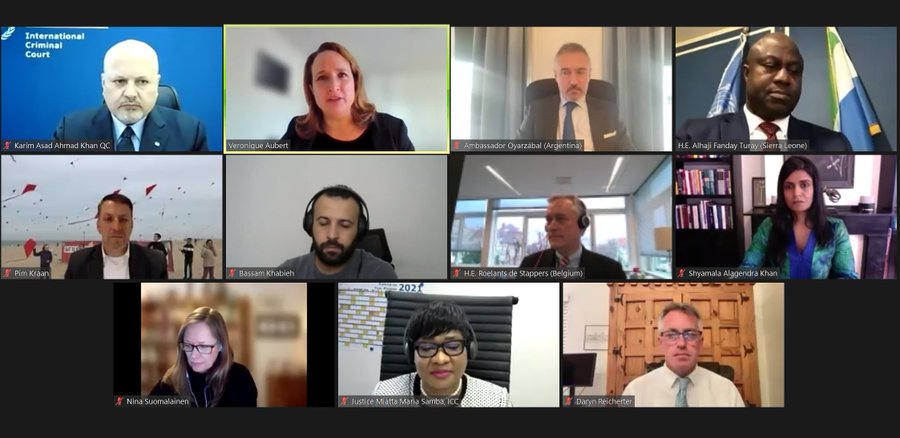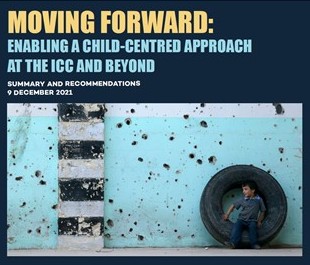Prosecutor Karim Asad Ahmad Khan QC reaffirmed his commitment to making access to justice for children – through concrete actions – a high priority of his mandate at the International Criminal Court (ICC), during the event ‘Moving forward: Enabling a child-centred approach at the ICC and beyond’ held by Justice Rapid Response and Save the Children on 9 December 2021.
At the online event – in collaboration with the ICC Office of the Prosecutor and with the support of Argentina, Belgium and Sierra Leone on the sidelines of the 20th Assembly of States Parties – Mr. Khan outlined how his office is making structural changes to ensure that crimes against and affecting children are taken into account before and during investigations. The Office of the Prosecutor’s Gender and Children Unit will directly take part in outlining investigation plans and a dedicated staff member advising on children will be given more seniority.
Panellists welcomed the announcement as a promising step towards advancing a child-centred approach in the context of international criminal justice, which they say has largely overlooked the needs of children and kept them invisible in the justice process.
Mr. Khan indicated that the challenge will now be the implementation of the Policy on Children that had already been unveiled in 2016 by the ICC and how to make such policies meaningful for survivors’ actual access to justice.
“I want an action plan, which this round table is going to trigger – and those watching should be part of that,” Mr. Khan told panellists and attendees of the event. He indicated the need to “make sure we take policy off the paper and implement it in practice, so that those that are in the mists, in the distance, that are obscured … namely children, are brought into high-definition focus”.
Putting this into practice requires political will and funding for expertise, panellists said. Since beginning his mandate in February 2021, Mr. Khan has already taken measures such as nominating Veronique Aubert, Lead on Children and Armed Conflicts at Save the Children, as his Special Advisor on Crimes Against and Affecting Children. Ms. Aubert is also a Justice Rapid Response Expert Roster member.
Speakers underscored a lack of political will to put children front and centre of investigations, which in turn results in a lack of financial investment. ICC Judge Justice Miatta Maria Samba highlighted the need to fund expertise, including for outreach in the countries concerned, to ensure that children’s rights and safety are taken into account, and that they can testify at ease.
“Funds must be specifically allocated for investigating and prosecuting crimes against children so that the International Criminal Court can efficiently be provided with expertise,” said Justice Samba, who took oath as an ICC judge in March 2021.
The speakers – specialized in child rights, international criminal justice and child trauma psychiatry, and representing Member States and civil society – highlighted the need for using dedicated expertise to ensure that children are given agency in the accountability process. Using highly specialized experts, who already work with children in domestic as well as international justice processes respecting the principle of do-no-harm, would help address fears of re-traumatizing survivors and to tackle misconceptions that children are not reliable witnesses.
“By excluding them as active participants, we are in fact perpetuating cultural and social norms which conform to the notion that children should be seen but not heard,” said Shyamala Alagendra Khan the Gender and Child Rights Advisor for the Independent Investigative Mechanism for Myanmar. “There needs to be a resolve to proactively reach out to children and ensure their full participation in all aspects of the Court’s work without assuming that they are incapable of participation by dint of their age alone.”
Part of the reason that children have been made invisible in accountability processes – with the investigation and prosecution of crimes remaining largely adult-centric – is their legal disenfranchisement, said Pim Kraan, Chief Executive at Save the Children Nederland, who presented findings of the report Advancing Justice for Children: Innovations to strengthen accountability for violations and crimes affecting children in conflict.
“As a result, children are basically erased from the narrative,” Mr. Kraan said. “Atrocities affecting children are often addressed as part of the broader crimes committed against the civilian population, and in the sentencing process there is limited age disaggregated analysis of how children actually have been affected by the violence.”
The Executive Director of Justice Rapid Response, Nina Suomalainen, put forward that by using a child-centred approach, investigations will be able to uncover a wider range of crimes affecting children. The tendency has been to focus on the recruitment and use of children in hostilities and not on all the other crimes affecting children.
“To address this gap, we have recruited specific expertise on child rights [to the Justice Rapid Response Roster] and have engaged all relevant mechanisms and investigations on strategies to integrate this expertise in their operations,” said Ms. Suomalainen, citing 18 deployments of child rights experts in 2021 alone drawing on dedicated financial support from Belgium and other donors.
Panellists drew on the justice and accountability processes undertaken in Sierra Leone as positive examples of national and international investigators, as well as child protection agencies, working together. They emphasized the need to include national expertise in international criminal justice processes.
“There is safe and effective precedence we can adopt and fine-tune for international criminal prosecutions,” said Ms. Alagendra Khan, who is also an expert on the Justice Rapid Response roster. “We should be willing to leave the bubble of international criminal justice and cast our net in new domestic waters to get the expertise that may be historically lacking in the Court.”
Children are “high-priority targets” for perpetrators in conflicts and should be an even higher priority focus for justice and accountability especially at the ICC, Ms. Alagendra Khan said. Daryn Reicherter, Director of the Human Rights in Trauma Mental Health Laboratory at Stanford University, emphasized that engaging children can empower the justice process and help children heal, but what is essential is that all stages of investigations integrate a tailored approach to the children’s specific identities.
Finally, Syrian photographer Bassam Khabieh – author of Witnesses to War: The Children of Syria – presented his work documenting the suffering of children who still do not have access to justice.
Mr. Khabieh recounted how after a cluster bomb hit the city of Douma, he held the hand of a little girl who thought he was her father, who – still unbeknownst to her – had been killed in the blast. She cried out to Mr. Khabieh, a stranger: “Dad, don’t leave me!”
“For this little girl, and for millions of children who are still suffering from the consequences of adult wars, let us work together to protect our children, and hold the criminals accountable, and do our best to prevent ongoing war violations against children and innocent civilians,” Mr. Khabieh said.
Click here to watch a recording of the event.
Click here to read the Summary and Recommendations Report from this event.
Panelists:
Veronique Aubert – Special Adviser to the ICC Prosecutor on Crimes Against and Affecting Children/Save the Children United Kingdom
Opening remarks
H.E. Roelants de Stappers – Ambassador and Permanent Representative of Belgium to the International Institutions in The Hague, Belgium
H.E. Alhaji Fanday Turay – Ambassador and Permanent Representative for Legal Affairs, Permanent Mission of Sierra Leone to the United Nations (New York), Sierra Leone
Keynote address
Karim Asad Ahmad Khan QC – ICC Prosecutor
Special presentation
Bassam Khabieh – photographer and author of Witnesses to War: The Children of Syria
Panellists
Pim Kraan – Chief Executive at Save the Children Nederland
Justice Miatta Maria Samba – ICC Judge
Nina Suomalainen – Executive Director, Justice Rapid Response
Shyamala Alagendra – Gender and Child Rights Advisor, Independent Investigative Mechanism for Myanmar (IIMM) and former Assistant Director of Public Prosecutions of Fiji
Daryn Reicherter – Director, Human Rights in Trauma Mental Health Laboratory
Closing remarks
H.E. Mario Oyarzábal – Ambassador and Permanent Representative of Argentina to the International Institutions in The Hague, Argentina
This event was undertaken with the support of Argentina, Belgium and Sierra Leone.

